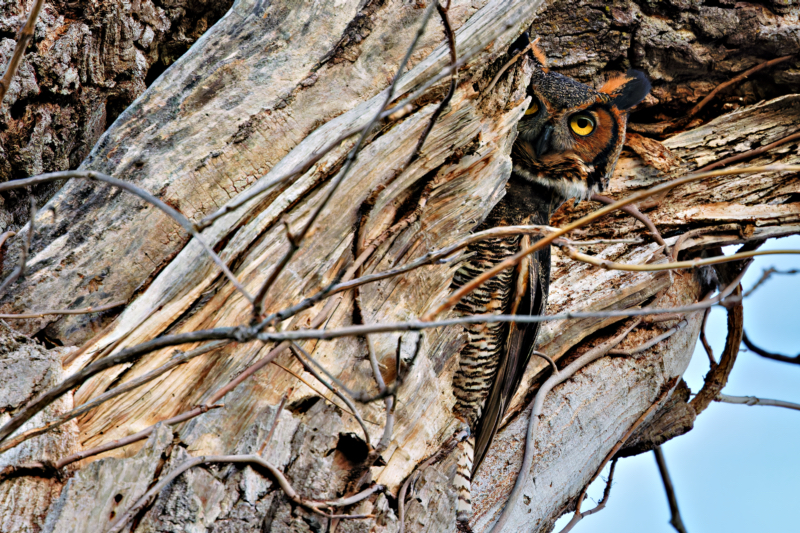As Halloween approaches, I can’t help but think about the eerie, mysterious creatures that inhabit the forests of Arkansas. Last year, I wrote about the symbolic and spooky Raven, often seen as a harbinger of mystery and magic in folklore (The Mystical Raven: A Spooky Symbol of Halloween). But this year, my attention is drawn to another bird that inspires awe and intrigue: the Great Horned Owl.
The Great Horned Owl, with its piercing yellow eyes, tufted “horns,” and haunting gaze, is an emblem of the wild’s darker side. Known as the “tiger of the woods,” this owl is a stealthy predator and a master of camouflage. I was lucky enough to photograph one recently, nestled deep within a twisted tree trunk. It was watching me with an intense stare that felt almost otherworldly.

Nature’s Perfect Predator
Great Horned Owls are formidable hunters, able to take down prey much larger than themselves. Their talons can exert a force comparable to a bite from a German shepherd! They’re also known for their stealth, these owls can swoop down silently, catching their prey completely off guard. In the quiet hours of dusk and dawn, their call, an echoing “hoot”, fills the forest with an eerie resonance that seems made for Halloween.
Masters of Camouflage
In my photo, you can see how well the Great Horned Owl blends into its surroundings. The texture and color of its feathers mimic the bark of the tree, allowing it to go unnoticed even when out in the open. This camouflage is one of the owl’s key survival adaptations, enabling it to hide from predators and prey alike. For a photographer, spotting and photographing one in its natural setting feels like uncovering a hidden treasure.
The Role of Owls in Folklore
Just like ravens, owls have a long history in folklore and superstition. They are often seen as symbols of wisdom, mystery, and the supernatural. In many cultures, hearing an owl’s call at night was thought to be a bad omen, associated with death or misfortune. Their silent flight and nocturnal habits only add to their mystical allure, making them a perfect Halloween icon.
Capturing the Mystery
As a wildlife photographer, moments like these are both rare and unforgettable. There’s something incredibly haunting about staring into the eyes of a creature that is so well-adapted to its nocturnal world. Photographing this Great Horned Owl was a reminder of the hidden wonders that lurk in the wild, and it’s especially fitting to share this image during the Halloween season, when we celebrate the mysterious and unknown.
If you’re interested in more Halloween-inspired wildlife tales, check out my post on the mystical raven from last year. Both the raven and the owl are testaments to nature’s capacity for beauty wrapped in mystery.
Gear and Settings
- Camera: Canon EOS R5
- Lens: Canon RF100-500 mm F4.5-7.1 L IS USM
- Focal Length: 500mm
- Aperture: f/7.1
- Shutter Speed: 1/800
- ISO: 6400
- Exposure Compensation: +0.3
- Location: Sequoyah National Wildlife Refuge, Oklahoma
Halloween or not, it’s always a thrill to encounter creatures that remind us of the wild’s untamed beauty and mystery. Keep your eyes, and ears, open this season. You never know what you might find hidden in the shadows of the woods.